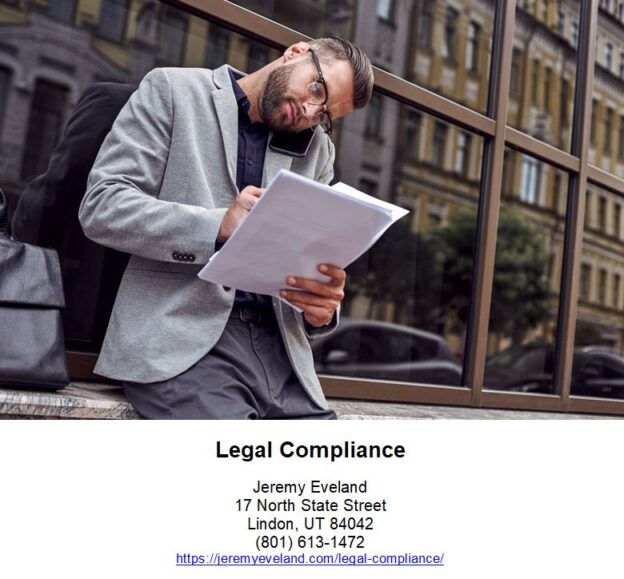When starting a business in Utah, it is essential to be familiar with the legal requirements for business insurance. Understanding these requirements not only protects your business from potential risks and liabilities but also ensures compliance with the state’s laws and regulations. In this article, we will provide you with a comprehensive overview of the legal requirements for business insurance in Utah, covering topics such as general liability insurance, workers’ compensation, commercial auto insurance, and more. By the end, you will have a clear understanding of the necessary insurance coverage for your Utah-based business, empowering you to make informed decisions and protect your venture effectively.

Legal Requirements for Business Insurance
As a business owner, it is crucial to understand the legal requirements for business insurance to protect your assets, finances, and credibility. Business insurance provides coverage against potential risks and liabilities that can arise in the course of conducting business operations. In the State of Utah, there are specific legal requirements that businesses must comply with to ensure adequate insurance coverage. This article will provide a comprehensive overview of business insurance, its importance, different insurance types, and the legal requirements in Utah.
Understanding Business Insurance
Definition and Purpose
Business insurance, also known as commercial insurance, is a type of coverage that provides financial protection to businesses against potential losses, lawsuits, damages, or liabilities. It safeguards businesses from the financial burden that may arise from accidents, property damage, lawsuits, or other unforeseen events. The purpose of business insurance is to mitigate the risks faced by businesses and provide them with the necessary financial protection to continue their operations.
Different Policy Options
Business insurance policies offer different coverage options to cater to the specific needs and risks of different businesses. Some common types of business insurance policies include general liability insurance, workers’ compensation insurance, commercial property insurance, commercial auto insurance, professional liability insurance, and umbrella insurance. Each policy has its own set of coverage and exclusions, tailored to the unique risks faced by businesses.
Coverage Limitations
While business insurance provides valuable protection, it is essential to understand that there may be limitations to the coverage. Each insurance policy has specific coverage limits, which define the maximum amount an insurer will pay in the event of a covered loss. It is crucial for businesses to carefully review their policies and understand the limitations to ensure they have adequate coverage for their specific needs.
Premiums and Deductibles
Premiums are the amount a business pays to the insurance company to maintain coverage. The cost of premiums is determined by several factors, including the size of the business, revenue, industry risk, location, previous claims history, and coverage limits. Deductibles, on the other hand, refer to the amount a business must pay out-of-pocket before the insurance coverage kicks in. It is important for businesses to assess the cost-benefit ratio of the premiums and deductibles to determine the most suitable insurance policy for their financial situation.
Policy Terms and Conditions
Business insurance policies come with specific terms and conditions that businesses must understand. These terms outline the rights and obligations of both the insurer and the insured. It is crucial for businesses to carefully review the policy terms and conditions to ensure they are aware of any exclusions, limitations, or requirements. Understanding the policy terms and conditions will help businesses make informed decisions and avoid any potential disputes in the future.
Importance of Business Insurance
Protection against Lawsuits
One of the primary reasons why business insurance is essential is its ability to protect businesses against lawsuits. In today’s litigious society, businesses are exposed to various legal risks and liabilities. Without proper insurance coverage, a lawsuit can be financially devastating and may even lead to the closure of a business. Business insurance provides coverage for legal fees, court costs, settlements, and judgments, ensuring that businesses can handle legal disputes without jeopardizing their financial stability.
Asset Protection
Business insurance also plays a vital role in protecting a business’s assets. Whether it’s equipment, inventory, property, or intellectual property, businesses invest significant resources in acquiring and maintaining their assets. In the event of theft, vandalism, fire, or other covered perils, business insurance can provide the necessary financial support to repair or replace damaged or stolen assets. Without insurance coverage, businesses may struggle to recover from such losses and face significant financial setbacks.
Financial Security
Business insurance offers financial security by providing coverage for unexpected events or accidents that can cause significant financial strain. Whether it’s a natural disaster, a customer injury on business premises, or a product liability claim, unexpected incidents can result in substantial financial losses. With proper insurance coverage, businesses can have peace of mind knowing that their financial security is protected, and they can recover from unexpected events without a severe financial burden.
Credibility and Trust
Having business insurance in place can enhance a company’s credibility and establish trust with customers, clients, and business partners. Many customers and clients consider insurance coverage as a sign of professionalism and reliability. By demonstrating that your business is adequately protected, you can build trust and attract more customers who value the protection and security provided by your business insurance.
Insurance Types
To ensure comprehensive coverage, businesses need to consider the different types of insurance available. Each type of insurance serves a specific purpose and addresses different aspects of a business’s operations and risks. Let’s explore the most common types of business insurance:
General Liability Insurance
General liability insurance is a fundamental insurance policy for businesses. It provides coverage for claims arising from bodily injury, property damage, personal injury, or advertising injury caused by your business operations, products, or employees. General liability insurance protects businesses from the financial burden of lawsuits, medical expenses, legal fees, and property damage claims.
Workers’ Compensation Insurance
Workers’ compensation insurance is mandatory for most employers in Utah. It provides coverage for medical expenses, disability benefits, and lost wages for employees who sustain work-related injuries or illnesses. This insurance not only protects employees by ensuring they receive necessary medical care and compensation but also shields employers from potential lawsuits resulting from workplace injuries.
Commercial Property Insurance
Commercial property insurance offers protection for a business’s physical assets, including buildings, equipment, inventory, and fixtures, against covered perils such as fire, theft, vandalism, or natural disasters. This insurance provides financial support to repair or replace damaged or stolen property, ensuring that businesses can quickly recover and continue their operations.
Commercial Auto Insurance
If your business owns vehicles or involves the frequent use of vehicles for business purposes, commercial auto insurance is essential. This insurance provides coverage for auto accidents, liability claims, medical expenses, and property damage caused by company-owned vehicles or vehicles used for business purposes.
Professional Liability Insurance
Professional liability insurance, also known as errors and omissions insurance, is crucial for businesses that provide professional services or advice. It protects businesses from claims arising from errors, omissions, negligence, professional malpractice, or breach of duty in the performance of professional services. Professional liability insurance covers legal fees, court costs, and damages awarded to the claimant.
Umbrella Insurance
Umbrella insurance acts as an additional layer of liability coverage beyond the limits of other primary insurance policies. It provides businesses with higher liability limits, ensuring that they are adequately protected against catastrophic events or high-value claims that exceed the limits of their primary insurance policies.
General Liability Insurance
Coverage Overview
General liability insurance provides broad coverage for businesses, protecting them against claims and lawsuits related to bodily injury, property damage, personal injury, or advertising injury. It covers various scenarios, such as slip and fall accidents on business premises, product liability claims, or defamation lawsuits.
Claims Covered
By having general liability insurance, businesses can rest assured that they are protected against a wide range of claims, including medical expenses, legal fees, court costs, property damage, personal injury claims, and advertising injury claims. Regardless of the size or nature of your business, general liability insurance is essential to mitigate the financial risks associated with lawsuits.
Limits and Exclusions
General liability insurance comes with coverage limits, which determine the maximum amount the insurance company will pay for a covered claim. It is important for businesses to assess their specific risks and choose coverage limits that adequately protect their financial interests. Additionally, general liability insurance policies typically exclude certain types of claims, such as intentional acts, professional errors, or pollution liability. Understanding the policy exclusions is crucial to avoid any potential coverage gaps.
Legal Requirements in Utah
In Utah, general liability insurance is not legally required for all businesses. However, many businesses, especially those involved in high-risk industries or working with government contracts, are often required to carry general liability insurance as a condition of obtaining permits, licenses, or contracts. It is essential for businesses to review all applicable laws, regulations, and contractual agreements to determine their specific legal requirements for general liability insurance in Utah.
Workers’ Compensation Insurance
Coverage Overview
Workers’ compensation insurance is a crucial insurance policy for businesses that provides coverage for medical expenses, disability benefits, and lost wages for employees who sustain work-related injuries or illnesses. It ensures that injured employees receive necessary medical care and compensation, while also protecting employers from potential lawsuits resulting from workplace injuries.
Mandatory Coverage in Utah
In Utah, workers’ compensation insurance is mandatory for most employers. Businesses with one or more employees are required by law to carry workers’ compensation insurance, regardless of the nature of their business or industry. Failure to comply with this requirement can result in significant penalties and legal consequences for businesses.
Benefits and Claims Process
Workers’ compensation insurance provides several benefits to both employees and employers. For injured employees, it ensures access to quality medical care, compensation for lost wages during recovery, and disability benefits if the injury or illness results in a permanent disability. For employers, workers’ compensation insurance shields them from potential lawsuits while providing a system for managing workplace injuries and ensuring the well-being of their employees.
The claims process for workers’ compensation insurance involves the injured employee reporting the injury to their employer, seeking necessary medical treatment, and filing a claim with the insurance company. The insurance company then evaluates the claim and determines the eligibility for benefits. It is crucial for businesses to have a clear understanding of the claims process and communicate it effectively to their employees to ensure a smooth and efficient process.
Legal Requirements in Utah
As mentioned earlier, Utah law requires most employers to carry workers’ compensation insurance. The State of Utah’s Labor Commission oversees the administration and enforcement of workers’ compensation laws. It is important for employers to comply with all legal requirements, including obtaining the necessary insurance coverage, maintaining accurate records, and promptly reporting injuries or illnesses. Failure to comply with these legal requirements can result in severe penalties, fines, or legal action against the business.

Commercial Property Insurance
Coverage Overview
Commercial property insurance provides coverage for businesses’ physical assets, including buildings, equipment, inventory, and fixtures. It protects businesses against covered perils such as fire, theft, vandalism, natural disasters, explosions, or plumbing leaks that can cause damage to a business’s property.
Property Types Covered
Commercial property insurance covers various types of properties, including owned or leased buildings, business equipment, machinery, furniture, inventory, supplies, and fixtures. It offers financial support to repair or replace damaged or stolen property, ensuring that businesses can quickly recover and resume their operations.
Additional Coverages
In addition to the basic coverage for property damage, commercial property insurance may also include additional coverages depending on the specific policy and business needs. These additional coverages can include business interruption coverage, which provides compensation for lost income and extra expenses incurred due to a covered event that interrupts business operations. Other additional coverages may include equipment breakdown coverage, flood insurance, or coverage for outdoor signs.
Legal Requirements in Utah
In Utah, commercial property insurance is not legally required by state law. However, businesses may be required to carry commercial property insurance as a condition of their lease agreement or as a requirement imposed by a lender. Additionally, certain industries or businesses operating in specific locations may have specific insurance requirements mandated by local ordinances or regulatory agencies. It is essential for businesses to review their lease agreements, loan agreements, and any applicable local regulations to determine their specific legal requirements for commercial property insurance in Utah.
Commercial Auto Insurance
Coverage Overview
Commercial auto insurance provides coverage for vehicles used for business purposes. Whether a business owns vehicles or frequently uses vehicles for business operations, commercial auto insurance is essential to protect against accidents, liability claims, medical expenses, and property damage.
Vehicle Types Covered
Commercial auto insurance covers a range of vehicles, including cars, vans, trucks, buses, and specialty vehicles used for business purposes. Whether it’s transporting goods, providing services to clients, or employee commuting, if a vehicle is primarily used for business operations, it should be covered by a commercial auto insurance policy.
Minimum Liability Limits
In Utah, the state requires businesses to maintain specific minimum liability limits for commercial auto insurance. The minimum liability limits for bodily injury liability and property damage liability are set at $25,000 per person, $65,000 per occurrence for bodily injury, and $15,000 per occurrence for property damage. However, it is important to note that these are minimum requirements, and businesses may need higher limits based on their specific risks and financial situation.
Legal Requirements in Utah
In Utah, businesses using vehicles for commercial purposes are legally required to carry commercial auto insurance. The Utah Department of Insurance oversees the regulation and enforcement of commercial auto insurance requirements. It is essential for businesses to comply with these legal requirements, obtain the necessary insurance coverage, and maintain accurate records to avoid penalties, fines, or legal consequences.

Professional Liability Insurance
Coverage Overview
Professional liability insurance, also known as errors and omissions insurance, is crucial for businesses that provide professional services or advice. It protects businesses from claims arising from errors, omissions, negligence, professional malpractice, or breach of duty in the performance of professional services. Professional liability insurance covers legal fees, court costs, and damages awarded to the claimant.
Professional Services Covered
Professional liability insurance covers a wide range of professional services, including but not limited to, legal services, accounting, engineering, architecture, consulting, IT services, healthcare services, and real estate services. Regardless of the industry or profession, businesses that provide professional services should consider obtaining professional liability insurance to protect themselves from potential claims.
Claims and Lawsuits
Professional liability insurance provides coverage for lawsuits and claims alleging errors, omissions, or negligence in the provision of professional services. Whether it’s a client claiming financial losses due to inaccurate advice or a patient alleging medical malpractice, professional liability insurance ensures that businesses have the necessary financial protection to defend against such claims and cover any damages awarded.
Legal Requirements in Utah
In Utah, professional liability insurance is not a legally mandated requirement for all professions. However, certain professional organizations or licensing boards may require professionals to carry professional liability insurance as a condition of membership or licensure. Additionally, clients or customers may also demand proof of professional liability insurance before engaging in business relationships. It is important for professionals to review any applicable industry regulations, licensing requirements, or contractual obligations to determine their specific legal requirements for professional liability insurance in Utah.
FAQ Answers
-
Are certain types of business insurance mandatory in Utah? Yes, certain types of business insurance are mandatory in Utah, depending on the number of employees and nature of the business. For example, workers’ compensation insurance is mandatory for most employers, while general liability insurance may be required for specific industries or contractual agreements.
-
What are the risks of not having business insurance? Not having business insurance can expose your business to significant financial risk, lawsuits, and potential closure. Without insurance coverage, businesses may be responsible for paying medical expenses, legal fees, court costs, and damages out of pocket, which can be financially devastating.
-
How much business insurance coverage do I need? The amount of coverage needed varies depending on factors such as the nature of the business, size, revenue, and potential risks involved. It is important to assess these factors and consult with an insurance professional to determine the appropriate coverage limits for your business.
-
How much does business insurance cost? The cost of business insurance depends on various factors, including industry, coverage limits, location, and previous claims history. Insurance companies assess the risks associated with a business and determine premiums accordingly. It is recommended to obtain quotes from different insurers and compare coverage options to find the most suitable and cost-effective insurance policy for your business.
-
Are there industry-specific insurance policies available? Yes, many insurers offer industry-specific policies to cater to the unique needs and risks of different sectors. These policies may provide tailored coverage options and endorsements specific to the industry, ensuring comprehensive protection for businesses operating in specialized fields.
In conclusion, understanding the legal requirements for business insurance is crucial for every business owner in Utah. Business insurance provides essential protection against lawsuits, asset damage, and financial burdens, while also enhancing credibility and trust with customers. By carefully assessing the specific risks and compliance requirements, businesses can choose appropriate insurance policies to ensure comprehensive coverage and peace of mind. It is advisable to consult with a business lawyer specializing in insurance law to navigate the complex legal landscape and ensure compliance with all relevant regulations.


















